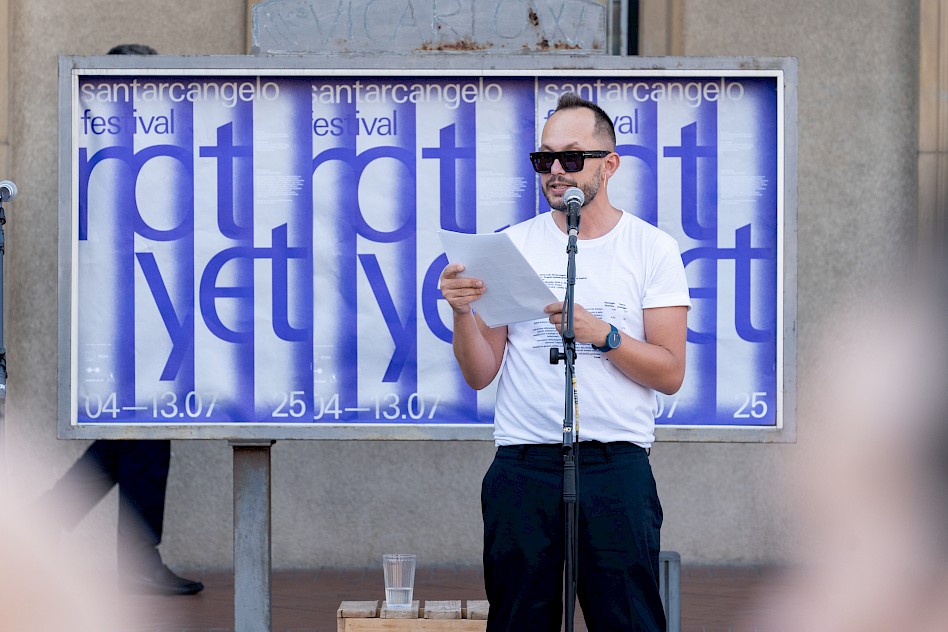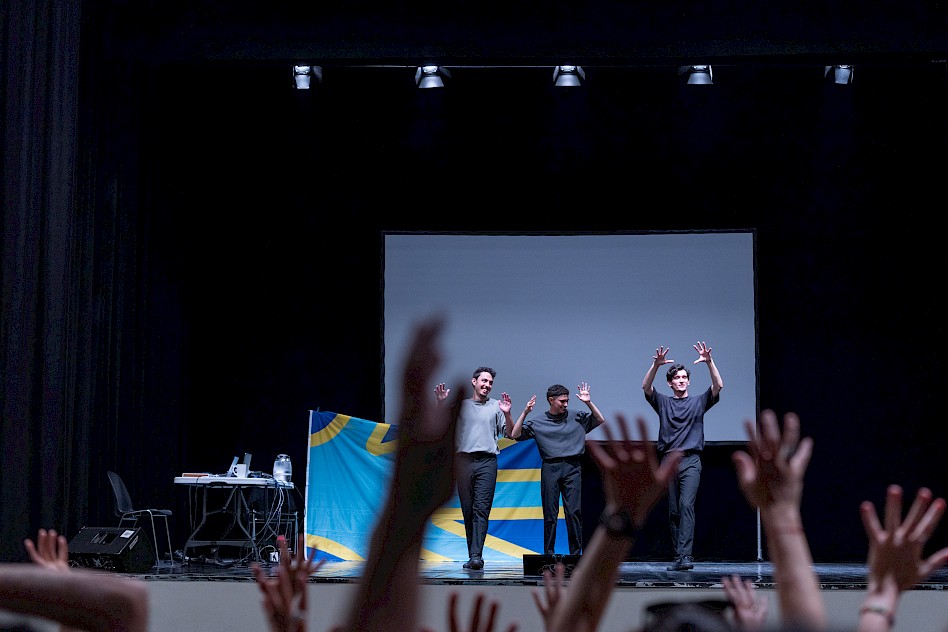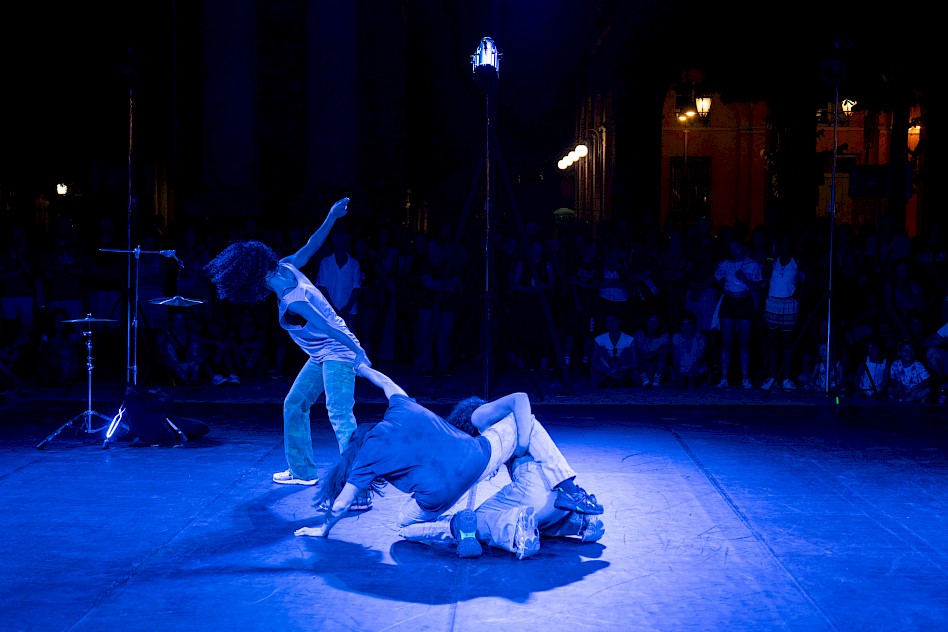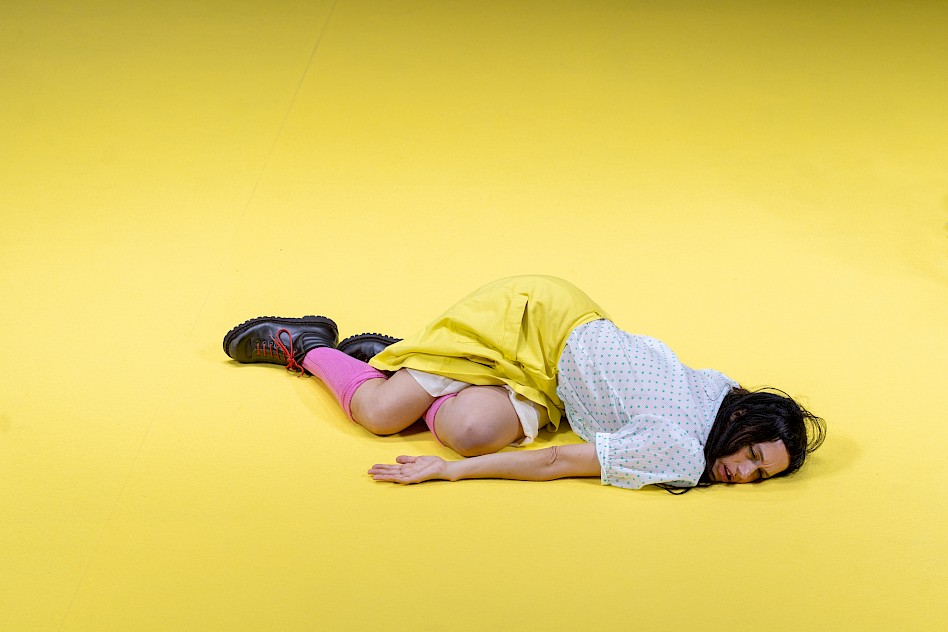“If something is not decided, it means that we can still organise resistance,” says Tomasz Kireńczuk, the artistic director of Santarcangelo Festival.
Santarcangelo Festival is the oldest Italian festival dedicated to the contemporary performing arts. From its first edition in 1971, the festival focused on the social and political traits of performing arts, creating an opposition to a commodified type of theatre. Tomasz Kireńczuk, the current artistic director of the festival, talks about the increasing need to engage in political debates from an artistic perspective, and to use performing arts as tools to build connections and foster unity in the times of uncertainty we live in. Initially, the Polish curator was selected as artistic director for Santarcangelo Festival for the 2022–2024 triennium. After that, his artistic direction was extended for a further two years. Now he’s leading the Festival through its 55th edition.

You became the artistic director of Santarcangelo Festival after leaving the Dialog-Wrocław Festival and Teatr Nowy in Krakow. How has your previous experience in Poland, a country facing difficult political challenges already at that time, influenced your decision to move your curatorial practice to Italy?
I moved to Santarcangelo at a difficult time, both personally and in general. Prior to this, I had been working for the Dialog-Wrocław Festival, but my contract was not renewed after 2019 due to a political conflict that arose when we decided to present Klątwa by Oliver Frljić in 2017. The Ministry of Culture wanted to censor the festival and cancel the performance because, in cultural terms, Oliver Frljić was public enemy number one in Poland. We were blackmailed very directly. Between a Monday and a Tuesday, I lost my main job. Although I was busy with other projects, the festival was very important to me.
After that, I started thinking about what it means to work independently in Poland, in cultural institutions that still depend on public funding and political pressure. I suffered a lot emotionally at that time, because in my view, I had experienced a kind of injustice. Then I returned to Teatr Nowy in Krakow, and I was still following some projects that I had been involved in. I also started working on networking projects focused on the internationalisation of young Polish theatre-makers, which helped me maintain international connections. However, even though I loved what I was doing, I still felt unable to utilise all my knowledge and do exactly what I wanted to do.
Initially, I was hopeful that I could start my own festival and forge new connections. Then I realised it wouldn't be so easy. Given the political situation in Poland, I realised that there was no space to continue with what I wanted to do. At that point, I started thinking about applying abroad. And then the opencall from Santarcangelo came. I was still depressed at that time, but many colleagues from several countries were encouraging me to apply. I took this as a sign to start thinking about the future. It was a form of self-therapy. I really felt ready to leave Poland. I had been following the festival for years, so it was a dream job for me. And when I was – surprisingly – selected: the perfect solution to my situation came.
After moving to Santarcangelo, was there anything that surprised you?
The festival has a lot of particularities, both in a good sense and in a bad sense. You need to learn how to deal with these particularities and defend the decisions you are making. At the beginning, there were a lot of challenges. When I moved to Santarcangelo, I had some knowledge of Italian, so I could start conversations early, but it was still very heavy at the beginning. I was lucky: my colleagues took care of me and gave me enough time to adapt. The most important thing was to understand the system in which the festival happens. It was important to get connected to the locals in order to understand the importance of the festival to the local community: understand what it means to be a performing artist in Italy, what it means to be dependent on or independent of institutions, and what an institution such as Santarcangelo Festival can do to support or develop.

Did your approach to curating the festival somehow change during your four years in Santarcangelo?
I came here with an idea to collaborate a lot internationally. The approach – based on collaboration, sharing ideas and working together – became stronger than I expected. I understood that there are many things we can’t and shouldn’t do on our own. It may sound like a political declaration, but we don’t want to be alone and unique.
You mentioned some particularities of the festival you had to understand first. While Santarcangelo Festival is one of the most significant events in the European theatre and dance scene, it also has a strong focus on the local community as it takes place in a small town in Emilia-Romagna. At the same time, its dramaturgy is highly progressive, including postcolonial, feminist and queer themes. Have you ever found these circumstances difficult in the past four years?
Not really. This is really special about Santarcangelo. Somehow, the programme becomes more and more risky and more and more radical year by year. I also feel that year by year, the presence of local audiences is growing. At the end, you have more than 50 years of history of the festival, so the people here are really experienced spectators. It's not an easy audience, but for me, programming the festival is not about entertaining the spectators or about making people pleased, because there will always be criticism and there will always be someone not happy with it. But I don’t think it's our role to make everyone happy – I don’t believe that's even possible.
We use a lot of spaces that have public ownership, which makes this connection very real. For me, it's also about asking what it means to occupy public spaces, especially the main square, for 10 days. It's about considering what we're offering in return, because the city is giving us a lot. It's also about how the festival can encourage locals to see the city from a different perspective. I think we achieve this by re-imagining common spaces and by bringing an amazing crowd of people to Santarcangelo, so that people can see that reality can be much richer and more diverse.

I feel like the uncertainty of today's world has been the underlying theme of your artistic direction from the beginning, and is now even more evident in this year's theme 'not yet'.
In my practice, the claim always comes after the programme has been finalised. I don't start with themes and topics. It always starts with the artists, their practices and their aesthetics. Once the programme is done, I try to see it all together. I like to see it from the hypothetical perspective of an audience member who is attending the whole festival and watching one performance after another in a dramaturgical line. It is important for my personal process to imagine the perfect way to watch a performance, because I believe that what you watch before and after has a significant impact on the way you engage with the performance.
After finishing the programme, I am trying to understand what all of the practices that we are showcasing and all of the artists that we are inviting have in common, because there are always many connections between them. This is because we are following many references from a political and social perspective. It usually takes time to understand what the festival has to offer. I think it is useful to have this claim because it helps us to create a narrative for the programme and invite people. And I don't like very direct claims: I prefer ones that generate curiosity without providing too much explanation.
What does 'not yet' mean to you exactly? Do you feel that this sense of uncertainty has become more urgent in recent years, even in the performing arts?
What I found very interesting in the practices of the artists we are presenting this year, is the sense of big changes happening, and of a reality that is heading in an increasingly negative direction. This is something we are experiencing every day, as evidenced by the genocide in Gaza, the war in Ukraine and Iran, the limitation of free speech, the aggression towards minorities, et cetera. This sense is much more evident than it was 10 years ago, at least from what I remember, and at least in Europe.
So 'not yet' refers to the present moment, in which changes are happening but have not yet been defined. In this state of uncertainty, we don't know what will happen tomorrow, because it's not just about five years from now: it's also about tomorrow, next week, or next month. This has changed a lot.
At the same time, I found it really interesting that the artists we are presenting this year perceive this uncertainty as a space for hope and action. If something is not confirmed or decided, it means that we can still try to exert pressure and organise resistance. Many of the works we are showing at the festival call for action. This shows that we are not powerless. We may not be able to stop the war, but that doesn't mean we can't do anything. Our decisions still carry some responsibility. This is also evident in the use of performative practices as tools to build connections and unity, and to facilitate collaborative processes. We can learn a lot from this – not only aesthetically, but also in terms of what we can really do with another body. Ultimately, it is always about bodies.

In recent years, Santarcangelo Festival has also become more international in terms of both the artists it is presenting and its audience. Despite the diverse cultural and political backgrounds of the artists invited to this year’s Santarcangelo Festival, there seems to be a very clear common ground in the themes they explore, such as focus on the (especially marginalised) body and its liberation, reflection on the ongoing presence of racism and colonialism in our society, and the re-imagining of forgotten histories. How do you see this shared thematic focus emerging across such varied artistic and cultural backgrounds?
It is difficult to speak about the common ground, because in the end, it comes from my interpretation of the performances we are presenting. But I would say there is one common ground: everything starts with a body. The body of someone speaking to you in multiple languages: sign language, body language, no language or the language of images. We have various bodies everywhere, and we must remember that. What we have to do is find a space for these bodies. We also need to understand why we react in certain ways to particular bodies. Some bodies are excluded and some are not seen. We must understand why certain bodies can appear in public spaces while others cannot, and who is making those decisions.
The physicality, presence and scent of the body unite the entire programme. You can explore various aspects of the body. You can explore the history of bodies that were racialised and subjected to violence because of their skin colour. There are bodies that have suffered because of their sexual identity. There are also bodies that have been marginalised because of disabilities, such as deafness. Then there are bodies that are fighting just to experience pleasure or to have the right to do what they want. It's not just about difficult experiences: it's also about suggesting that we are the owners of our bodies, and that this right applies to everyone.
At this point, the line between the performing arts and political activism begins to blur. Do you perceive art as a space where more imaginaries – in the times of uncertainty – are possible?
I think this is the most powerful part of performing arts. I feel that it is something that we really need now. Because I believe we live in a reality where there is less and less space to imagine multiple ways of living and multiple scenarios for the future. The less we question reality, the easier it is to govern it. And I think this is something that performing arts can do, also because of their direct connection to bodies and their direct influence, which is where the imaginatory process happens.
I am not so interested in whether people like the performances we are presenting at the festival. I am more interested in people who might not like the performances leaving the theatre with questions, doubts or even anger. I think this has a lot to do with imagination. We are in Italy, in a very beautiful town, and it's easy to assume that everywhere is the same. But it's not like that: we are still very privileged. And this realisation can come from the imaginative process.
Interview conducted by Kristýna Vinařová


